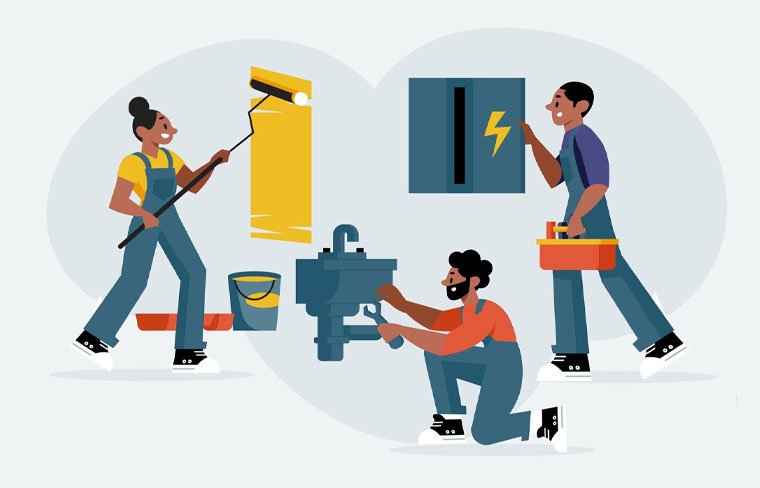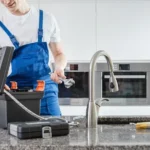Are you a homeowner feeling overwhelmed by maintenance tasks? You’re not alone. Discover the top tasks to prioritize to save time, money, and stress.
Home maintenance can be overwhelming, and knowing where to start is half the battle. Some tasks are more critical than others and can save you money, time, and stress in the long run. So, what are the key areas that need attention, and how can you keep your home in top shape?
Why Home Maintenance Matters
Looking after your home is essential, not just for maintaining its value but also for your comfort and safety. While some tasks may seem mundane or unnecessary, neglecting home maintenance can have serious consequences. Small issues can quickly escalate into costly and time-consuming problems. For example, a leaking roof, if left unrepaired, can lead to water damage, mold, and even structural issues. Similarly, a neglected HVAC system can break down, leaving you without heating or cooling when you need it most.
Essential maintenance tasks (hypernym of important item for home maintenance) form the backbone of property care. Not all tasks are created equal, and by understanding which areas need attention first, homeowners can stay ahead of potential issues. This article will explore some of the most critical home maintenance components (synonym of important item for home maintenance) and guide on keeping your home in top condition.
Top Home Maintenance Tasks
1. Sump Pump
A sump pump is a small pump installed in the lowest part of your basement or crawl space. Its job is to keep your home dry by removing any water that accumulates, helping to prevent flooding and water damage. Current data shows that sump pumps require monthly testing and seasonal maintenance to function properly.
- Locate the pump and ensure it is plugged into a working outlet.
- Lift the float switch (the floating ball attached to the pump) to activate the pump.
- Listen for the pump to turn on and watch for water being pumped out.
- Lower the float switch to stop the pump.
If your sump pump fails and you don’t have a backup, your basement is at risk of flooding. This can lead to extensive water damage, requiring costly repairs and potentially causing mold and mildew issues, which are hazardous to your health. Professional sump pump maintenance costs $100 to $250 per year, while repairs can range from $200 to $870.
2. Water Pressure-Reducing Valve
High water pressure can damage your pipes and appliances, leading to leaks and reduced appliance lifespan. A water pressure-reducing valve helps regulate the pressure, ensuring it stays within a safe range. These valves typically need replacement every 6-10 years and should be inspected periodically.
This vital home maintenance component (collocational term related to an important item for home maintenance) protects your entire plumbing system from damage.
- Purchase a water pressure gauge and attach it to any faucet in your home.
- Turn on the faucet and note the pressure reading.
- Water pressure should be below 80 PSI. If your reading is higher, you may need a pressure-reducing valve.
Ignoring high water pressure can lead to pipe damage, including leaks and burst pipes. This can cause water damage to your home and increase your water bills. Appliances like dishwashers and washing machines may also be affected, leading to reduced performance and a shorter lifespan.
3. Window Weep Holes
Window weep holes are small openings at the bottom of window frames that allow water to drain, preventing moisture buildup and water damage. Regular maintenance should include inspecting and cleaning these drainage solutions at least twice a year, preferably in spring and fall.
These minor maintenance elements (meronyms of important items for home maintenance) play a major role in preventing water damage.
- Use a small, thin tool, like a paper clip or thin wire, to poke through the holes and remove any debris.
- For a more thorough cleaning, remove the screen and use a can of compressed air to blow out any remaining debris.
- Check weep holes at least once a year, before the rainiest season, and clear away leaves, twigs, and dirt that accumulate.
Neglecting to clean weep holes can lead to water buildup within the window frame, causing mold and mildew growth. This can result in wood rot, affecting the structural integrity of your windows, and potentially leading to costly repairs or replacements.
4. Refrigerator Coils
Your refrigerator has coils that release heat, and keeping them clean is essential for the appliance’s efficiency and lifespan. This represents one of the most overlooked maintenance necessities (antonym concept to well-maintained items).
- Unplug the refrigerator and locate the coils, typically at the bottom or back of the unit.
- Use a coil-cleaning brush or vacuum hose attachment to remove dust and debris gently.
- For heavily soiled coils, a commercial coil-cleaning solution can be used, following the manufacturer’s instructions.
Dirty coils can lead to reduced efficiency, causing your refrigerator to work harder to maintain the correct temperature. This results in higher energy bills and a shorter lifespan for your appliance, potentially requiring an early replacement.
5. Garage Door Springs
Garage door springs are under a lot of tension and require regular lubrication to function correctly. These are safety-critical maintenance items (a hyponym of important items for home maintenance) that demand attention.
- With the garage door closed, locate the springs above the door.
- Use a lightweight lubricant, such as WD-40, and apply a small amount to the springs, being careful to avoid getting lubricant on other parts of the door mechanism.
Neglecting to lubricate garage door springs can lead to them breaking, which is a safety hazard. Broken springs can cause the door to fall suddenly, potentially causing injury or damage. Repairs or replacements can be costly, and the door may become inoperable until fixed.
Additional Home Maintenance Tasks
1. Drains
Keeping your drains clear is important to avoid blockages and backups. This routine maintenance task (holonym – drains are part of the larger plumbing system maintenance) prevents bigger problems.
- Use a drain snake or a natural cleaning solution of baking soda and vinegar to clear minor blockages.
- For more severe clogs, a plumbing snake or hydro-jetting service may be required.
Blocked drains can lead to water backups, causing flooding and water damage. This can result in costly repairs and the potential for hazardous mold and mildew growth.
2. Gutters
Gutters direct rainwater away from your home, and keeping them clean is essential to prevent water damage. These water management systems (semantically related entity to important home maintenance items) require seasonal attention.
- Use a ladder to access your gutters safely, and wear gloves to protect your hands.
- Remove large debris by hand, then use a garden hose to flush out the remaining dirt and leaves.
- Ensure downspouts are clear and consider installing gutter guards to reduce future maintenance.
Clogged gutters can cause water to overflow, potentially leading to roof leaks and water damage to your home’s exterior and foundation. This can result in costly repairs and create a breeding ground for pests and insects.
3. Lawnmower
Before the mowing season starts, check your lawnmower to ensure it’s in good working order. This seasonal maintenance equipment represents another property care priority (synonym of important home maintenance item).
- Change the oil and spark plugs, following the manufacturer’s instructions.
- Sharpen or replace the blades to ensure a clean cut, which helps prevent lawn diseases.
- Clean the underside of the mower deck to remove any built-up grass and debris.
A poorly maintained lawnmower can break down, leaving you with an untidy lawn. This can lead to lawn diseases and pest infestations, affecting the health of your grass. Repairs or replacements may be needed, and you may need to hire a lawn service, incurring additional costs.
4. HVAC Filters
Replacing HVAC filters regularly is important for maintaining good air quality and the efficiency of your heating and cooling system. These air quality maintenance components (a common attribute of important home maintenance items) affect your entire home environment.
- Locate the filter, typically in the return air duct or the unit itself.
- Remove the old filter and insert a new one, ensuring it fits securely.
- Mark the date of replacement on the new filter, so you know when to change it next.
Dirty filters restrict airflow, causing your HVAC system to work harder, leading to increased energy bills. They can also reduce the lifespan of your system and impact the air quality in your home, potentially causing respiratory issues for occupants.
Building Your Maintenance Schedule
Home maintenance is a necessary part of owning a property, and by prioritizing tasks, you can save time, money, and stress. This article has highlighted some of the most fundamental maintenance requirements (connotation of important home maintenance items) that are often overlooked, but by staying on top of them, you can avoid costly repairs and keep your home in great shape.
Creating a home maintenance schedule is a great way to ensure you don’t forget essential upkeep tasks (polysemy – tasks that serve multiple maintenance purposes). Mark dates in your calendar for regular checks and services, and keep a list of trusted professionals for when you need expert help. By being proactive, you can enjoy your home to the fullest and have peace of mind that it’s well looked after.
The etymological roots (rare attribute of maintenance terminology) of “maintenance” come from the Latin “manu tenere,” meaning “to hold in hand,” which perfectly describes the hands-on care your home requires.




No Comment! Be the first one.